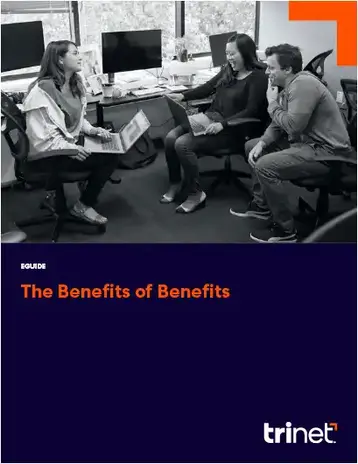
Do you have a flexible spending account (FSA) to help you pay for your healthcare expenses? If so, you may have questions about how to spend your FSA dollars. Usually, the money you put into your FSA is lost if you don't spend it during the plan period. That would be a waste.
But the range of FSA-eligible items that remaining funds can absorb may surprise you. Here we'll explain what to know about your unspent FSA funds. We've also built a comprehensive list of the eligible items you can pay for with FSA dollars before they vanish.
Use it or lose it
Employees should try to use every dollar of their flexible spending accounts. Otherwise, once the plan year and grace period end, they lose the unspent money.
The most common FSA expenses that may spring to mind include:
- Insurance plan deductibles and copayments.
- Over-the-counter medicine.
- Dental work.
In addition, many unexpected products and services are considered FSA-eligible expenses. Here’s a closer look.
Qualifying FSA expenses
Eligible expenses exist within three basic types of flexible spending accounts.
Health care FSA (HCFSA)
You can use this to cover things like qualified medical, vision and dental expenses not covered by your insurance plans. Qualified medical expenses usually must be for services or products that prevent or treat physical or mental illnesses or disabilities. You can't use them for things like vacations that some people take to promote general health.
Limited expense health care FSA (LEX HCFSA)
You can use the money in this FSA to pay for eligible dental and vision care products and services. Normally, if you have a health savings account (HSA), you cannot also have a health care FSA.
Dependent care FSA (DCFSA)
You can use your DCFSA account to pay for services needed for children younger than 13 or dependent adults. Use DCFSA dollars to cover services like work-related babysitting, daycare and preschool. A DCFSA can be combined with an HSA.
Surprising FSA-eligible items
Let’s look at some surprisingly eligible FSA expenses. Note that you may need a letter of medical necessity (LMN) from a doctor or other health care practitioner.
Addiction treatment
Several costs related to addiction treatment are eligible to be paid by your FSA.
- Transportation: Travel to and from Alcoholics Anonymous (AA) meetings. Transportation for any medical care is an eligible expense.
- Inpatient rehabilitation: Expense for treatment at a therapeutic center, including meals and lodging.
- Halfway house: People leaving an inpatient facility for addiction treatment sometimes live in a sober-living house afterward. This helps them ease the transition back to their lives. This expense requires an LMN.
Household items
Specific household items contribute to good health, which is why they are covered by health care FSAs.
- Air conditioning: People with certain respiratory illnesses and allergies need air conditioning to filter their home's air. This allows them to keep the windows closed (and keep pollen out). This item requires an LMN.
- Hypoallergenic pillows, pillow protectors and mattress covers: For people who suffer from allergies to dust and pollen, these products may keep their symptoms at bay while they sleep. In some cases, your HCFSA will reimburse you for these products with an LMN.
- Batteries: If you use them to power a medical device, your batteries are FSA-eligible.
Personal care products
Creating a healthy environment that promotes rest and comfort and reduces stress is why some of these items are FSA-eligible.
Common items that can be purchased include:
- Adhesive bandages.
- Denture adhesive (HCFSA, LEX FSA). People with dentures need this to keep their teeth in place.
- Hand sanitizer (HCFSA). You’ll need a prescription since it contains an active medical ingredient.
- Pain relief medication purchased over the counter.
- Menstrual care products.
- Sunscreen (HCFSA). If the SPF is 15 or above, sunscreen is eligible.
You can also buy things like:
- Acne products. Certain topical products like lotions, creams and cleansers that treat skin conditions are FSA-eligible.
- Anti-snore guards (HCFSA). With an LMN, these may be eligible for FSA reimbursement.
- Arch support (HCFSA). Use shoe inserts if you were born with high arches. They may be considered eligible FSA expenses.
- Compression gloves (HCFSA). These can help ease arthritis pain.
Fertility treatments and birth control
Your FSA may cover many products and treatments that help promote or prevent pregnancy.
- Fertility tests: Fertility kits that test sperm and ovulation are covered.
- Intrauterine insemination: IUI is a process whereby a doctor injects sperm into the mother’s uterus to aid in conception.
- In vitro fertilization: In IVF, an egg is fertilized by sperm outside the body.
- Birth control pills: If you have a prescription, your FSA can pay for birth control pills.
It may also cover other types of contraception such as the following:
- Contraception patch.
- Vaginal birth control rings.
- Intrauterine devices (IUDs).
- Spermicidal creams.
- Condoms: Birth control methods that don’t use an active medical ingredient are FSA-eligible expenses, too.
Baby and childcare
Items related to the employee's children's health and well-being are FSA-eligible. You can charge certain childcare expenses, including daycare, after-school programs or extended care, to your DCFSA. However, these expenses are only eligible for reimbursement if you need them for you or your spouse to work. Other coverable expenses include:
- Childcare agency fees (DCFSA). Families can use a childcare agency to help them find a nanny. Funds pay for the agency if the nanny is necessary for you or your spouse to work.
- Au pair. Your DCFSA will reimburse you for au pair expenses. An au pair is a young nanny from another country who comes to live with you to help with childcare.
- Baby monitors (HCFSA). Some parents of newborns use these monitors to prevent sudden infant death syndrome (SIDS).
- Baby formula. With an LMN, HCFSAs cover the difference in price between a specialized formula and the regular formulas.
- Diaper rash cream. You’ll need a prescription.
- Bed-wetting aids. If someone in your family suffers from nighttime incontinence, your FSA can cover their overnight absorbent pants or mattress pads.
Alternative medical treatments
If you or a family member depend on alternative medicine, your FSA may cover these costs.
- Alternative healers: Homeopathy, naturopathy and reiki are just a few examples of alternative healing that are FSA eligible.
- Acupressure: Do you have body pain, nausea, or anxiety? If so, you might want to use your FSA to pay for acupressure.
- Acupressure mats and wristbands are eligible, too. In some cases, you might need an LMN.
- Acupuncture: Some people prefer acupuncture to relieve pain, promote sleep or improve digestion. It’s one of the eligible FSA expenses for which you may need an LMN.
Healthcare-related transportation
Getting to doctor appointments and other required treatments can be costly. Here’s how your health care FSA can help you save money.
- Automobile modifications: If you have an LMN stating that your vehicle needs modification, this is an FSA-eligible expense.
- Parking: If you have to pay to park at your doctor’s office, you can charge it to your FSA.
- Transportation: Bus, taxi, train, plane fares and ambulance service are generally covered. You’ll have to show the plan administrator documentation to prove the travel is healthcare-related.
Breastfeeding
Working mothers can take advantage of their FSAs to cover breastfeeding-related expenses such as:
- Breast pumps and pump replacement parts.
- Breast milk storage bags.
- Breast milk bottles.
- Absorbent breast pads.
- Breastfeeding classes.
- Breast pump bustier.
Other eligible expenses
Other surprising expenses that are eligible for your health care FSA include:
- Books. If your doctor recommends a health-related book with an LMN, you can charge that expense to your FSA.
- Braille books. Your FSA will reimburse the difference between the price of the braille book and the same book in non-braille form.
- Blood sugar test kits and strips. Note that these are not eligible with limited purpose or dependent care FSAs.
- Breast implant removal. If the implants are causing health problems, and you have an LMN, your FSA will reimburse you for this.
- Personal trainer and/or gym membership. If you have diabetes or extreme obesity, payments to your personal trainer can be FSA-eligible with an LMN.
Always refer to your FSA documentation to see the complete FSA eligibility list on your individual plan. Doing so can help you spend your FSA funds wisely.
Need more answers?
A little research can go a long way toward helping you use your FSA to cover eligible expenses and take advantage of tax-free spending.
TriNet is the HR provider of choice for employers seeking to offer a better benefits package to their employees. Interested in more options and stronger support? Let's connect today!






